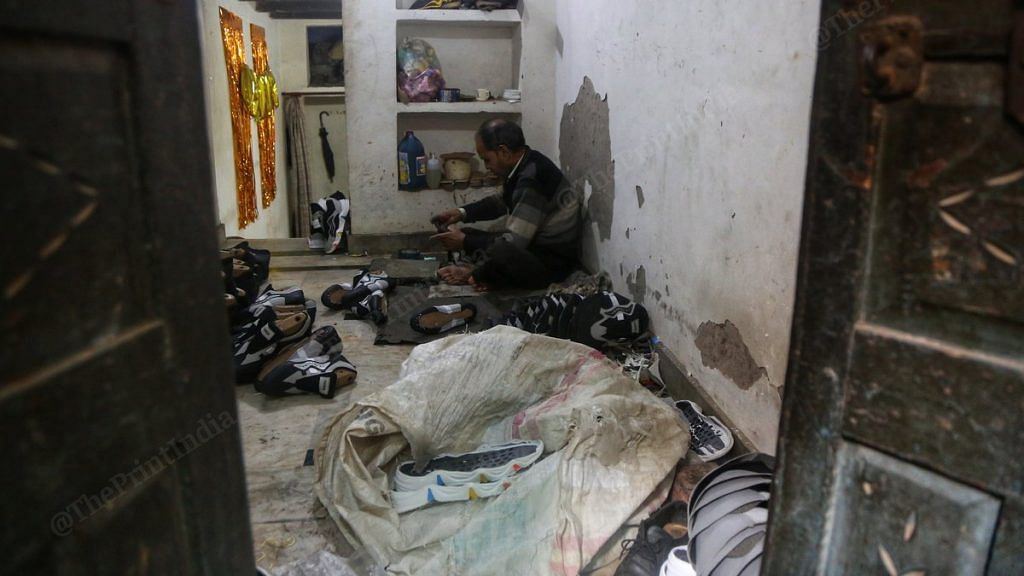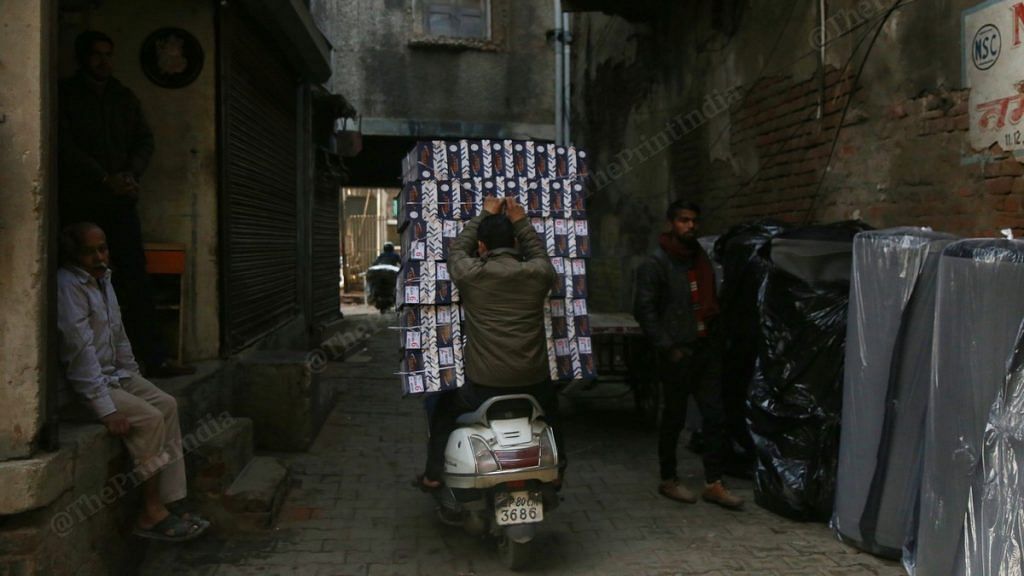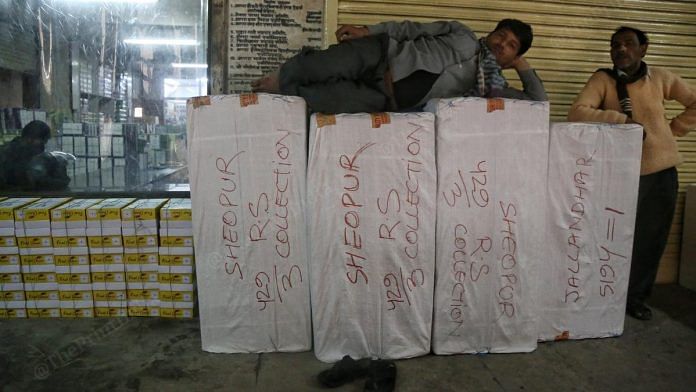Agra: Almost every house in the lanes of Agra’s Chakki Pat locality seems to have something to do with shoes. There are people sorting shoe soles, trimming rubber for slippers, separating shoelaces, cutting out brand logos to be stitched on to sneakers, or even hand-carving footwear.
Agra, a shoe-making hub since Mughal times, is India’s leading producer today, accounting for 65 per cent of the footwear worn in the country and 28 per cent of exports. Many of the small manufacturers and labourers in the industry operate out of Chakki Pat.
However, the mood is subdued. The Covid lockdowns and the ongoing wave of the pandemic have been hard on the industry, but the hike in the Goods and Services Tax (GST) rate — to 12 per cent from 5 per cent — on footwear below Rs 1,000, effective this month, has left businesses reeling. Many are making losses or even shutting shop.
Due to the desperate conditions, shops in Hing ki Mandi, known as Agra’s shoe market and famous for its leather footwear, went on strike last Wednesday to protest against the increased GST rate, which they said will lead to lower sales and less profits. Business has since resumed, but customers are said to be few and far between.
From raw material sellers and labourers to small manufacturers and traders, all stakeholders in the industry say they are suffering. Their plight echoes that of many other industries in the MSME (Micro, Small & Medium Enterprises) sector, where about 9 per cent of businesses shut down due to the pandemic and crores of people lost their jobs.
Many karigars (artisans) and labourers in Agra’s shoe industry too have been forced to leave the industry. Vinay, a labourer in a manufacturing unit, told ThePrint that many of his colleagues have recently shifted to other occupations, like selling vegetables.
“I have to support my parents and siblings… let’s see how long I can continue. I have been working for the past six to seven years, but the situation has never been this bad,” he said.
Also Read: Shutdowns, debts, layoffs: Bengal tanners pushed to the edge say 3rd Covid wave will finish us
’70 per cent of small manufacturers have shut shop’
Abhikam Singh’s tiny office in Chakki Pat is full of pictures of B.R. Ambedkar and Lord Buddha, like many other shops and houses in the area.
Singh is the president of the Joota Dastkar Federation, an umbrella organisation of shoe artisans. He told ThePrint that ever since the GST hike became operational on 1 January this year, many traders have stalled or cancelled orders that were placed earlier.
“Manufacturers are now worried as they have already purchased the raw materials and paid the labourers wages. What will they do now? Traders are now refusing the orders due to the increased GST rates,” Abhikam said.

His brother Anirudh Singh, who is also a member of the artisans’ federation, explained that the GST hike has worsened a situation that was already bad due to lockdowns and increasing cost of raw materials.
“As of now, the relief to labourers provided by the government does not cover shoemakers. It focuses mainly on construction workers. It would be good if the government expanded this,” Anirudh said.
Most workers in Agra’s shoe industry belong to the Jatav community (which comes under the list of Scheduled Castes).
Anirudh explained that before the pandemic, close to 3.5 lakh workers were associated with Agra’s shoe industry, and there were 3,500-4,000 small manufacturers. Each year, nearly 50 lakh pairs of shoes used to be made, out of which 25 per cent were exported (mainly to European countries) while the remaining went to the domestic market.
“Since 2020, 70 per cent of the small manufacturers have shut shop due to no business. They have now joined big factories where they get paid much less on a daily basis. All their pride and ownership has gone,” Anirudh said.
Tilak Raj is one such small manufacturer who is struggling to stay afloat. “With the GST increase, how will we employ karigars?” he asked, as a worker entered the manufacturing unit.
“I have become old doing this work, and even my great-grandfather was in this line of work. In all this time, we have never seen such bad days,” Tilak said.
“GST should not apply to us, but to those who manufacture 100 shoes in an hour. How can you tax the same amount to those who make shoes by hand and those who make them using machines?” Tilak said.
According to him, most of the karigars he employed earlier have become vegetable vendors now to make ends meet.
“Since the BJP government came to power, company ghaate mein chal rahi hai (has been suffering losses). It would be better if they focused on helping us than on building the Ram Mandir,” he said.
When asked about the upcoming Uttar Pradesh elections, Raj said he would vote for whoever thought of his children.
‘We are going though Kalyug’
Gagandas Ramani, president of the Agra Shoe Factor Federation, a traders’ association, said the GST rate had more than doubled, posing an unprecedented challenge.
“Sixty-five per cent of the country wears shoes which are produced from Agra. Shoes from here sell more, as they are cheaper. At the 45th GST meet, it was decided to increase the GST on shoes and textiles (the latter has been deferred) from 5 to 12 per cent. We have been protesting this since November,” he said.

Ramani explained that most traders did business through borrowings and due to their earlier orders being stalled, they were not able to process new orders. According to him, the combined effects of demonetisation, lockdowns, and GST have harmed the industry tremendously, and the hardest hit were poor karigars.
Ramani recalled that the late finance minister Arun Jaitley said the textile and footwear industry were both labour-oriented and should be treated similarly.
“Since the government had gone back to 5 per cent GST for the textile industry, the same should be done for the shoe industry as well,” Ramani said.
“I am only asking for what they [the government] have been saying all this while,” he added, before giving in to a moment of despair: “Right now, we are going through Kalyug (era of darkness), jiski lathi uski bhains (whoever wields the stick has control).”
Abdul Alim, who sells raw materials for shoes at Hing ki Mandi, said that although the GST hike does not affect him directly, business is down since there is less demand for his wares.
Demands to government
The traders’ as well as artisans’ unions have submitted memorandums to the district magistrate of Agra, addressing the Prime Minister, requesting a roll-back of the GST rate.
Besides this, the Shoe Workers’ Federation also asked for the prices of raw materials to be controlled as they increase 20-25 times in a year. They have also requested that loans should be given at lower interest rates.
“We have gotten no relief from the government. They roll out many yojanas (schemes) but none of them is implementable and they are only limited to training or toolkits being available in factories. Currently, the industry is functioning at a complete loss,” Abhikam Singh said.
Ramani said he also met with Uttar Pradesh Finance Minister Suresh Khanna Tuesday, who assured the traders that the matter would be raised during the GST Council meeting in February. Ramani said he felt hopeful that the GST rate would be reverted to the earlier 5 per cent.
“If we do not find a solution, we will have no other option but to carry out another strike,” Abhikam said.
MSMEs, including shoe industry, struggling since 2020
The Covid pandemic has had a serious impact on the MSME sector. MSMEs created close to 11 crore jobs in India according to the 2015-16 National Sample Survey, but about 3 crore of these were lost in the first few months of the pandemic.
According to an Economic and Political Weekly report published in June last year, production in MSMEs fell from an average 75 per cent capacity to 13 per cent during the peak of the lockdown in May 2020.
The report, based on a mixed-methods survey to “ascertain the level of sectoral distress at the peak of the nationwide lockdown”, further said that, on average, businesses retained only 44 per cent of their workforce; 69 per cent of firms reported that they did not think they could survive longer than three months.
While things picked up as the economy reopened, the second Covid wave gave another blow to the sector. In April and May 2021, nearly 60 per cent of the addition to non-performing assets (NPAs) came from MSMEs, compared to 30 to 40 per cent earlier.
Business is hard to maintain as the cost of production has increased due to limited operation hours and lockdowns, and with financial help from the government reportedly only reaching 20 per cent of top MSMEs. Adding to these woes are substantial increases in the cost of raw materials and lower market demand.
In May 2021, almost 60 per cent of the 6,000 MSMEs surveyed by LocalCircles, a community social media platform, said they would either have to scale down operations or shut shop.
Agra’s shoe industry accounts for 65 per cent of the footwear worn in the country and 28 per cent of India’s overall footwear exports.
Another shoe cluster in India is in Kanpur-Unnao, and this too is witnessing a recession due to multiple lockdowns, cancellation of international orders, and demands for discounts on orders already supplied.
Many brands did not pay for orders, and labourers bore the brunt of the crisis since they were not paid their dues. In 2020, the Council for Leather Exports noted that the Tamil Nadu cluster lost export orders worth close to Rs 2,800 crore due to cancellations of orders.
(Edited by Asavari Singh)
Also Read: Jalandhar’s Rs 2,000-cr sports goods industry says Covid shut 40% units, govt says no distress



